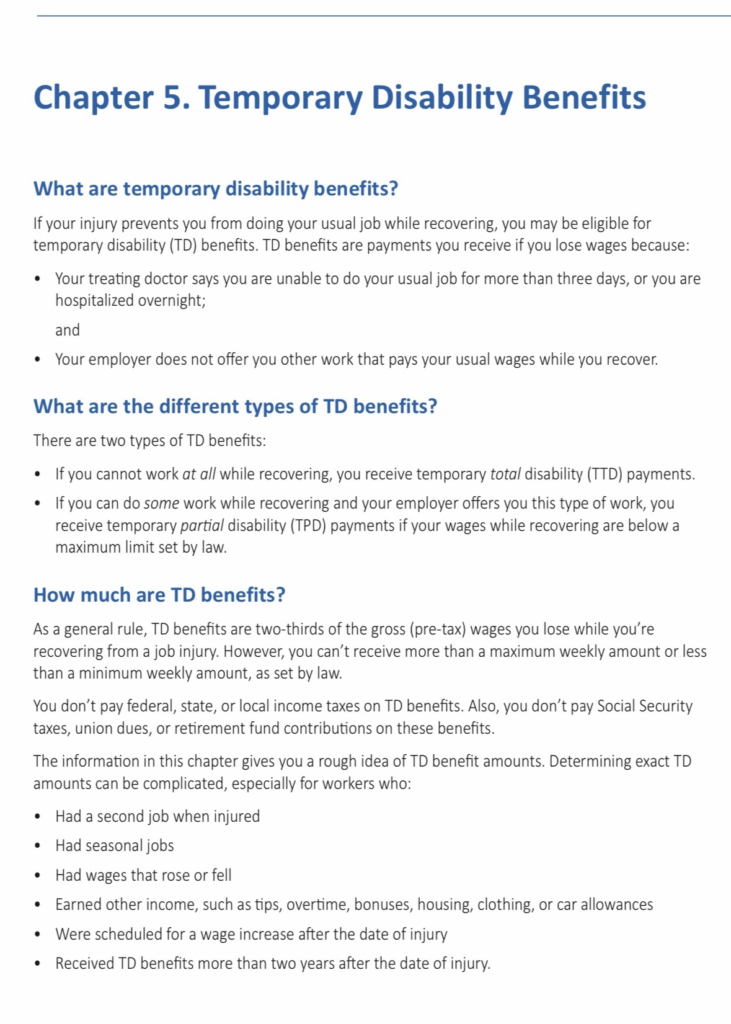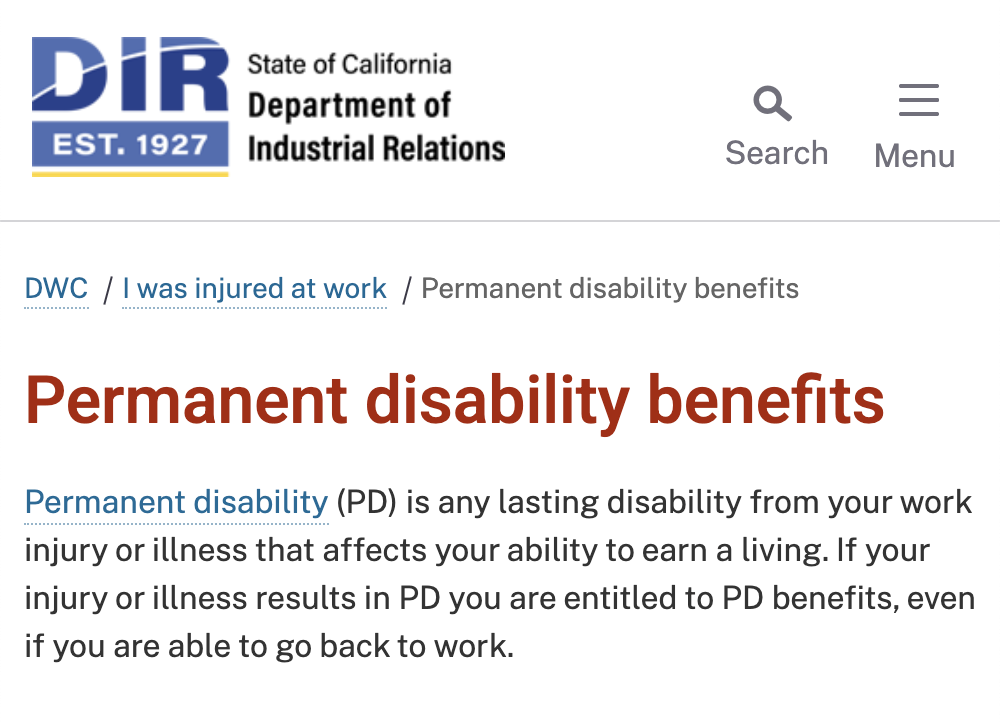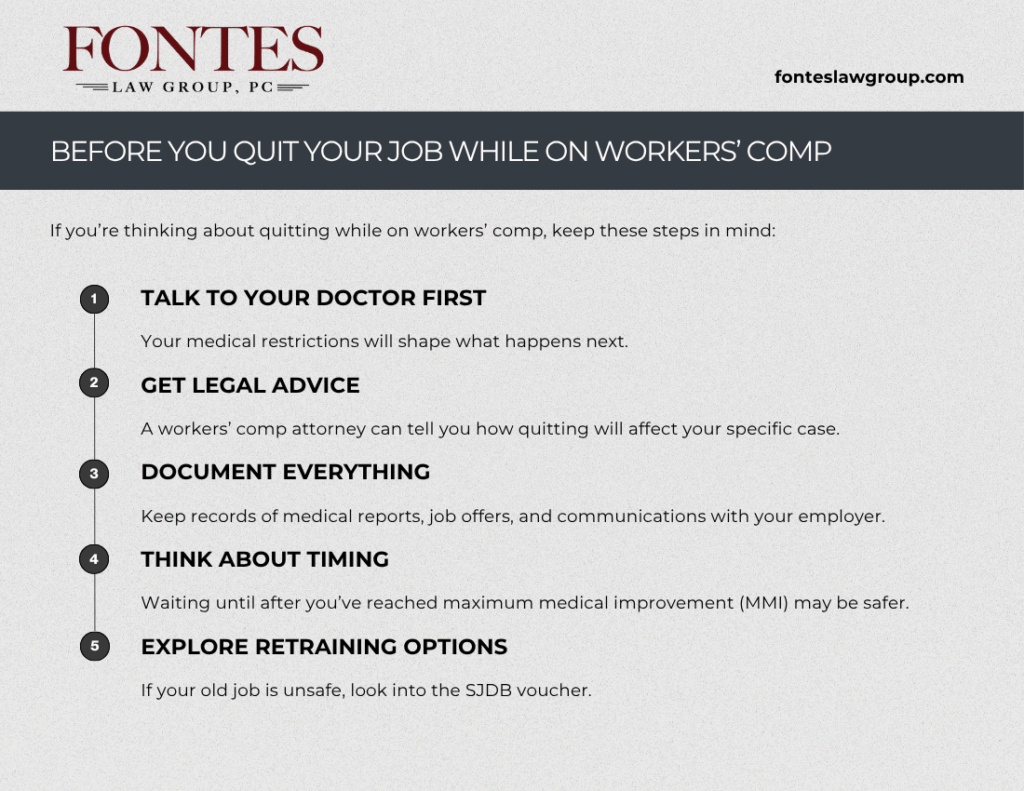Can I Quit My Job While on Workers’ Comp?
You might be asking yourself this question right now: Can I quit my job while I’m still on workers’ comp?
In California, the short answer is yes, but the long answer is more complicated.
While you’re recovering, the idea of quitting your job may come up. Before you decide, remember that quitting doesn’t cancel your worker’s compensation claim, but it may impact the type of benefits you continue to receive.
Many injured workers in California feel stuck. They’re in pain, they’re worried about bills, and they don’t want to go back to a workplace where they got hurt. At the same time, they’re afraid that quitting will mean losing benefits altogether.
If you’re in that position, you’re not alone, and understanding your rights is the first step to protecting your future.
What Happens if You Quit While on Workers’ Comp?

Workers’ compensation in California is designed to cover medical treatment and replace part of your lost wages if you get hurt on the job. These benefits are paid through your employer’s insurance, not by the employer directly. That’s important, because it means you don’t automatically lose benefits just because you decide to leave your job.
- Medical benefits continue. If your claim is already approved, your employer’s insurance must keep paying for your medical care related to the injury, even if you quit.
- Wage replacement may change. Temporary disability benefits replace a portion of the wages you lose because you can’t work. If you quit voluntarily, you may no longer qualify for those payments, since they are tied to your inability to work for your employer.
- Permanent disability is unaffected. If your injury leads to permanent impairment, those benefits are based on your medical condition and work restrictions, not your job status.
Medical Benefits: Do They Continue if You Quit?
Yes.
Medical benefits are the most stable part of workers’ comp. As long as the injury was job-related and your claim was accepted, the insurance company must keep paying for care. That includes doctor visits, surgery, prescriptions, and rehabilitation.
The California Division of Workers’ Compensation (DWC) makes it clear that employers and their insurers remain responsible for necessary medical care even if the employee leaves the job.
So if you’re worried about losing access to your treatment, know that quitting won’t cut off medical coverage.
Wage Replacement: Temporary Disability Benefits
Here’s where it gets tricky.
Temporary disability (TD) benefits are meant to replace wages when your doctor says you can’t work because of your injury. If you quit, the insurance company may argue that you are no longer eligible for TD because your lost income is a result of quitting, not your injury.
For example:
- If your doctor has you on work restrictions and your employer can’t accommodate them, TD should continue, even if you quit.
- If you quit before your doctor takes you off work, the insurer may reduce or stop TD, claiming you chose not to work.
This is one of the biggest risks of quitting before your claim is resolved.
Permanent Disability Benefits

Permanent disability (PD) is different.
These benefits are based on lasting impairment and reduced earning capacity, not your employment status. If your doctor finds you have permanent limitations, your PD benefits will be calculated using a formula that includes your wages, age, occupation, and disability rating.
In other words, whether you stay or quit, permanent disability is still owed if your injury qualifies. short-term cash relief is worth losing that future flexibility.
The key point: quitting doesn’t cancel your claim, but it may impact the type of benefits you continue to receive.
Can You Start a New Job While on Workers’ Comp?
Yes, but there are rules.
If you find another job that accommodates your restrictions, you can take it. But you must be upfront with your doctor and the insurance company about your new employment.
A new job can affect your benefits in several ways:
- If you earn less than before, you may still receive partial wage-loss benefits.
- If you earn the same or more, your temporary disability payments will usually stop.
- If the new job violates your restrictions, you risk harming your health and hurting your claim.
The important part is honesty. Hiding new income can lead to accusations of fraud.
Vocational Rehabilitation and Retraining Benefits
California offers a benefit called Supplemental Job Displacement Benefits (SJDB). If your employer can’t offer you a job that fits your restrictions, you may qualify for a $6,000 voucher to pay for education or retraining.
This can be used for tuition, books, and even computer equipment. Quitting doesn’t automatically disqualify you from SJDB, but eligibility depends on your doctor’s report and your employer’s ability (or inability) to offer you modified work.
Before You Quit Your Job While on Workers’ Comp

Why Some Workers Consider Quitting
Quitting while on workers’ comp isn’t always about walking away. Many injured employees face real struggles that push them toward this decision:
- Toxic work environment. Some workplaces pressure injured workers, question their injuries, or make them feel unwelcome.
- Fear of reinjury. Returning to the same tasks that caused harm can feel unsafe.
- Better opportunities. Sometimes workers see a chance for a new job that fits their abilities better.
- Stress and mental health. The pressure of dealing with an injury at the same workplace can take a serious emotional toll.
If you’re considering quitting, weigh these reasons against the possible financial and legal effects on your claim.
Fontes Law Group’s Perspective
At Fontes Law Group, we see this situation all the time. Injured workers feel trapped between protecting their health and protecting their paycheck. The decision to quit is deeply personal, but it should be made with a full understanding of the consequences.
Our attorneys fight to make sure your rights are protected no matter what. We help clients:
- Understand how quitting could affect their case.
- Challenge insurance companies when they unfairly cut off benefits.
- Secure permanent disability or retraining vouchers when appropriate.
- Plan for the future with clear, compassionate guidance.
With offices in Santa Ana and Riverside, we proudly serve workers across Southern California. And because we’re fully bilingual in English and Spanish, we make sure every client understands their options in the language they’re most comfortable with.
FAQs: Quitting on Workers’ Comp
Q: Can my employer punish me for quitting?
No. You’re free to leave your job at any time. But your employer doesn’t have to rehire you later, and quitting may impact certain benefits.
Q: Will quitting end my workers’ comp case?
No. Your claim continues, but wage replacement benefits may be reduced or cut off.
Q: What if I already found another job?
That’s allowed, but you must stay within your medical restrictions. Keep your doctor and insurer informed.
Q: Do I have to tell my new employer about my injury?
Legally, you don’t have to disclose everything, but if you have restrictions, your new job must be safe for you. It’s usually best to be honest to avoid future problems.
Final Thoughts
Quitting your job while on workers’ comp is possible, but it’s rarely simple. Your medical benefits will continue, but wage replacement may be reduced or denied. Permanent disability is unaffected, and retraining benefits may still be available.
The decision comes down to your health, your finances, and your future.
If you’re considering leaving your job, don’t make the decision alone. Fontes Law Group is here to help. Our team has guided injured workers across Southern California through these tough choices, making sure their benefits and rights are protected every step of the way.
With offices in Santa Ana and Riverside, and a bilingual team ready to serve in English and Spanish, we’re here to make sure you don’t go through this process alone.
Need advice about your case? Contact Fontes Law Group today!
